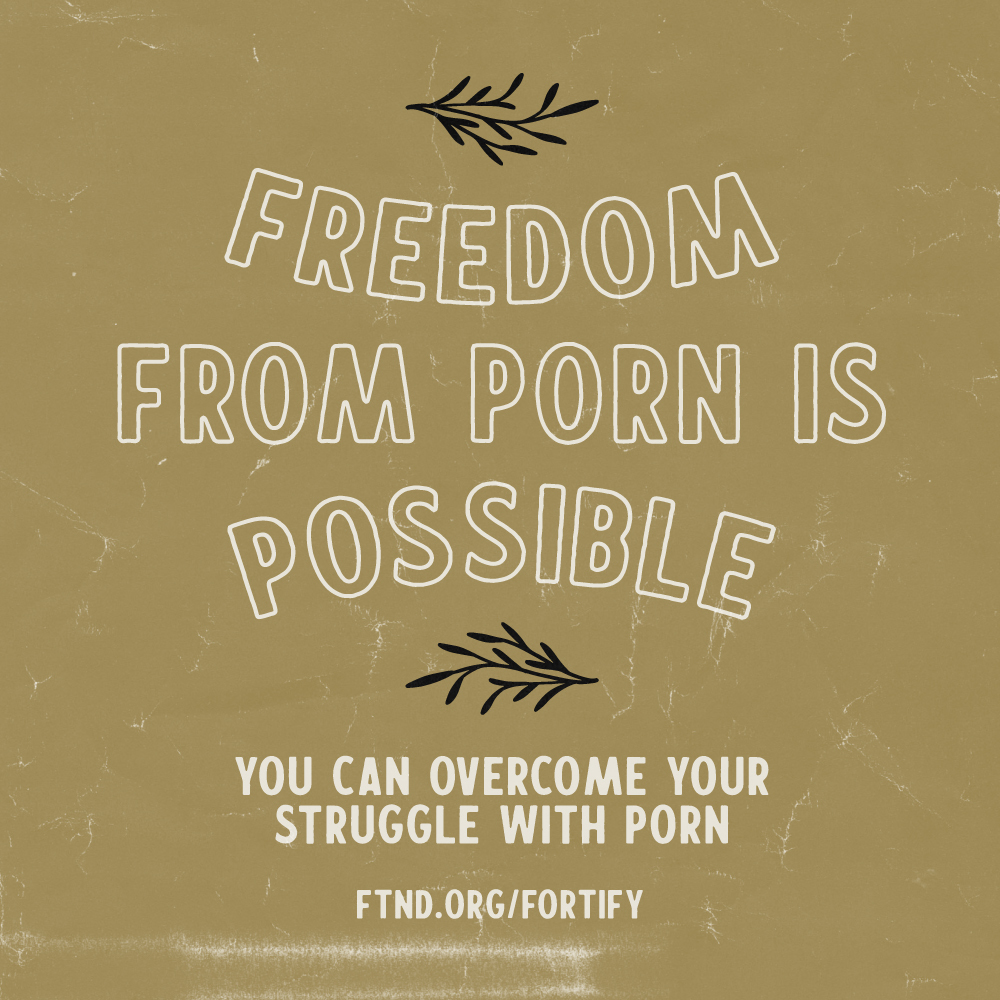Photo by Justin Luebke. 6-minute read.
The following post is geared towards those in recovery from a struggle with porn. While Fight the New Drug is not a recovery-focused resource, we encourage anyone needing help to check out our friends at Fortify. Visit Fortify if you’re interested in resources aimed at recovery.
At Fight the New Drug, we talk a lot about the negativity and harms of pornography and porn struggles based on existing science, research, and personal stories. We talk a lot about how it will affect the consumer’s brain, harm their relationships, and how the porn industry is connected to sex trafficking. That information is important for society to understand, but let’s be honest, it can also get discouraging to hear about, especially if you have a porn habit you’re trying to quit.
So, let’s look at the other side of the equation. While the effects of porn are negative, struggling with it doesn’t automatically make a person “bad.” We get many stories from people who are not only struggling but have recovered from it. Regardless of how long they’ve struggled, recovery is more than possible.
This article is for anyone in the midst of recovery.
The Journey
All in all, recovery isn’t simple.
Recovery is a journey and a process. More often than not, therapists and psychologists see that pure willpower, quitting cold turkey, and just white-knuckling through your problems don’t really solve anything. This is because habits, compulsions, or, in severe cases, addictions are made up of many different facets of the consumer’s life and are often tied to deep-rooted issues. It would be easy to blame a porn obsession on a high sex drive, but that is almost never the case. In fact, many porn consumers even suffer from severely low libido.
Different stages of the recovery process may require different focuses and strategies. The basic principles remain the same, but as the person grows and progresses, they should adapt their plans and actions accordingly. It is very important to know where they are in their recovery and what they need to do to succeed most.
The fact is, recovery is almost never a straight line. If you’ve been at this a while, you’ve probably been in any or all of the phases at some point. That doesn’t matter. What matters is where you are right now and where you will go from here.
Note that the following information is based on many stories we have received from thousands of individuals worldwide. Do not use the information in this article in place of advice and counseling from a mental health professional.
Phase One
The main problem consumers usually face during their recovery is negativity. Porn has gotten a handle on their lives, and it has really messed up some stuff. Because of this, they feel angry, disappointed, and even hateful toward themselves. None of this is helpful. Even if you feel you deserve it, piling negativity over your existing problems solves nothing. Shame often does not improve a struggle with porn. It only fuels it and intensifies it.
The other huge issue you could be facing is isolation. When life feels this out of control, one of the worst things you can do is try to go it alone. If you don’t have someone in your life you can talk to about this stuff, start looking.
So what can you do about it?
This phase may require a little more structure than the others. It might involve putting filters on your devices or restricting access to them altogether and staying off of things like social media, dating apps, or anything with easily accessible sexual content. Some users of the Fortify Platform will even break their days down into a strict schedule, with their daily goals and responsibilities laid out for them.
Focus on every victory and stay positive. Reaffirm your long-term goals, but don’t expect an overnight change. Try to take things one day at a time. Give yourself the space you need to recover.
Phase Two
Now, it’s time to start stretching your muscles and expanding your strategies. You’ve learned a lot and doing some really good things, but you might be having trouble gaining real long-term traction. Try to examine your setbacks more. Look at how you felt before and after each one.
What were you doing before your setback? How was your day going? Are there other habits (video gaming, eating junk food, etc.) you are overindulging that lead you to watching porn? Are they happening in the same places, with the same devices?
You will probably need to start examining some of the deeper issues of your porn obsession at this point. Which can be difficult, but be patient and thoughtful. Try to see past the basic urges and look at what is driving you to watch porn. You’ll also need to practice your in-the-moment reactions to triggers and urges. Having positive activities to reroute your urges is key, or calling a friend if you’re on thin ice is a great spur-of-the-moment safety line.
Remember that simply trying to get rid of an unwanted porn habit is easier when that habit is replaced with something healthier and beneficial to you. For example, here are 5 things you can do instead of watch porn.
Phase Three
At this phase, you’re doing really well. You’re probably starting to see pretty long streaks, and you’re becoming a master at getting out of the habitual/compulsion/addiction cycle. However, sometimes, this stage can be just as difficult because it comes with its own set of obstacles.
It is really important to stay vigilant. Remember that you got here because you got good at the little things, but if you let them slide, you could end up sliding back big time.
Another thing to watch out for is backward rationalization. This means that you convince yourself that you’re doing well enough to watch a little porn. (Intentionally “weaning” off of porn is not necessary and can be ultimately unhelpful.) Maybe you convince yourself that you deserve a reward. Maybe you believe you aren’t officially struggling anymore, that you are someone who can now moderate your porn patterns. No matter how you spin it, this type of rationale is the same “just this once” mentality that got you stuck in unhealthy and unwanted habits in the first place.
Even after long streaks of victories, things like urges, depression, anxiety, or triggers can crop up regularly. In fact, it is almost a guarantee that they will. Don’t get discouraged because you aren’t “cured” yet. If you expect life to become challenge-free through your recovery, you’re in for a letdown. Keep moving forward.
New Challenges
New growth brings new challenges, so remember what you have learned and be aware of new traps. Full recovery is possible, but that doesn’t mean we should open ourselves to harm. You may always feel some level of urges or triggers, and you will probably discover new ones as you grow. That’s okay.
As you build personal resilience and positive connections, you will have the capacity to avoid and withstand them.
Need help?
For those reading this who feel they are struggling with pornography, you are not alone. Check out Fortify, a science-based recovery platform dedicated to helping you find lasting freedom from pornography. Fortify now offers a free experience for both teens and adults. Connect with others, learn about your unwanted porn habit, and track your recovery journey. There is hope—sign up today.
Fight the New Drug may receive financial support from purchases made using affiliate links.

Your Support Matters Now More Than Ever
Most kids today are exposed to porn by the age of 12. By the time they’re teenagers, 75% of boys and 70% of girls have already viewed itRobb, M.B., & Mann, S. (2023). Teens and pornography. San Francisco, CA: Common Sense.Copy —often before they’ve had a single healthy conversation about it.
Even more concerning: over half of boys and nearly 40% of girls believe porn is a realistic depiction of sexMartellozzo, E., Monaghan, A., Adler, J. R., Davidson, J., Leyva, R., & Horvath, M. A. H. (2016). “I wasn’t sure it was normal to watch it”: A quantitative and qualitative examination of the impact of online pornography on the values, attitudes, beliefs and behaviours of children and young people. Middlesex University, NSPCC, & Office of the Children’s Commissioner.Copy . And among teens who have seen porn, more than 79% of teens use it to learn how to have sexRobb, M.B., & Mann, S. (2023). Teens and pornography. San Francisco, CA: Common Sense.Copy . That means millions of young people are getting sex ed from violent, degrading content, which becomes their baseline understanding of intimacy. Out of the most popular porn, 33%-88% of videos contain physical aggression and nonconsensual violence-related themesFritz, N., Malic, V., Paul, B., & Zhou, Y. (2020). A descriptive analysis of the types, targets, and relative frequency of aggression in mainstream pornography. Archives of Sexual Behavior, 49(8), 3041-3053. doi:10.1007/s10508-020-01773-0Copy Bridges et al., 2010, “Aggression and Sexual Behavior in Best-Selling Pornography Videos: A Content Analysis,” Violence Against Women.Copy .
From increasing rates of loneliness, depression, and self-doubt, to distorted views of sex, reduced relationship satisfaction, and riskier sexual behavior among teens, porn is impacting individuals, relationships, and society worldwideFight the New Drug. (2024, May). Get the Facts (Series of web articles). Fight the New Drug.Copy .
This is why Fight the New Drug exists—but we can’t do it without you.
Your donation directly fuels the creation of new educational resources, including our awareness-raising videos, podcasts, research-driven articles, engaging school presentations, and digital tools that reach youth where they are: online and in school. It equips individuals, parents, educators, and youth with trustworthy resources to start the conversation.
Will you join us? We’re grateful for whatever you can give—but a recurring donation makes the biggest difference. Every dollar directly supports our vital work, and every individual we reach decreases sexual exploitation. Let’s fight for real love:



